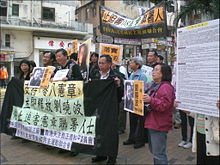Charter 08
Charter 08 (Chinese 零八宪章, pinyin Língbā Xiànzhāng) is a manifesto signed by originally 303, now more than 5000 Chinese intellectuals and civil rights activists calling for political reform and democratization in the People's Republic of China.
"One hundred years have passed since China's first constitution was written. 2008 marks the sixtieth anniversary of the Universal Declaration of Human Rights, the thirtieth anniversary of the establishment of the Democracy Wall in Beijing, and the tenth anniversary of China's signature on the International Covenant on Civil and Political Rights. We are approaching the twentieth anniversary of the 1989 Tian'anmen massacre of students demonstrating for democracy. Among the Chinese people, who endured human rights disasters and countless struggles during those years, there are now many who clearly recognize that freedom, equality, and human rights are universal values of humanity, and that democracy and constitutional government are a fundamental framework for protecting those values."
The Charter is one of the rare documents written in China that calls on the ruling Chinese Communist Party to grant greater freedom of expression and allow free elections. Its name is a reference to Charter 77, which dissidents used to criticize the communist regime in Czechoslovakia.
A total of 303 people, including Liu Xiaobo, Ai Weiwei, as well as the well-known bloggers Tsering Woeser and Zeng Jinyan, lawyers and a disgraced former Communist Party official, defied the threat of their arrest and came forward as first-time signatories. The charter calls for 19 measures to improve the human rights situation in China. Among the demands are an independent judiciary, freedom to form associations and an end to the one-party system. "All kinds of social conflicts have accumulated ceaselessly and feelings of discontent have grown steadily," it says. "The present system has become backward to such an extent that change is no longer avoidable." China, it said, is the only major power that still maintains an authoritarian system that restricts human rights in such a way. "This situation must change! Political democratic reforms can no longer be postponed!"
Charter 08 demands
The signatories of Charter 08 are committed to:
- A new constitution
- Separation of powers
- A democratic legislation
- An independent judiciary
- The control of officials by the public
- The guarantee of human rights
- Regular elections of government officials
- The equality of town and country
- The freedom to form associations
- Freedom of assembly
- Freedom of speech
- Religious freedom
- The introduction of civic education
- The protection of private property
- A financial and tax reform
- The introduction of social security
- Environmental protection
- A federal republic
- A truth commission.
Arrest and conviction of signatories, International reactions to it.
On 8 December 2008, two days before the 60th anniversary of the adoption of the Universal Declaration of Human Rights by the UnitedNationsGeneral Assembly, Liu Xiaobo was arrested by police at his home. Only hours after his arrest, the text of Charter 08 was published on the Internet.
Frank-Walter Steinmeier, then German Foreign Minister, said on 10 December 2008:
"We must not remain silent. Not even vis-à-vis China, and even more so in the face of the arrest of Liu Xiaobo, who was arrested in China two days ago because he wanted to distribute the "Charter 2008" appeal. An event that once again documents the unsatisfactory human rights situation."
The well-known dissident Liu Xiaobo was sentenced to 11 years' imprisonment in December 2009 because of his signature for human rights. There were protests against this from all over the world, including from the German Chancellor Angela Merkel. In 2010, Liu Xiaobo was awarded the Nobel Peace Prize.

Demonstrators protest in Hong Kong against the arrest of Liu Xiaobo
Search within the encyclopedia